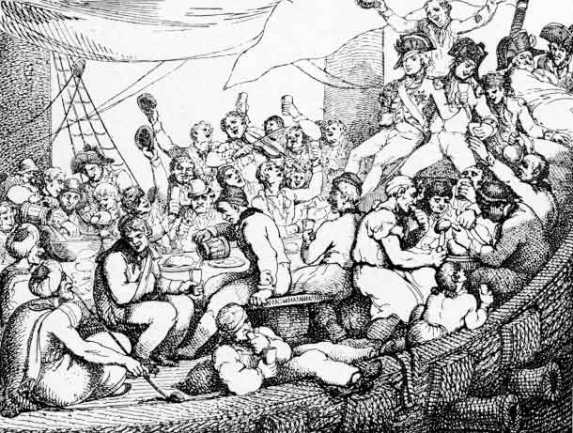In the seventeenth, eighteenth and nineteenth centuries a sailor’s life was not a happy one…
Quite apart from the fact that many in the navy had been impressed, ie beaten up and kidnapped by roving gangs of government-sponsored thugs; quite apart from the high chance of death in battle or from disease; not to mention scurvy, chit food often rotten, stale or wormy; apart from the horrific penal system which centred around flogging minor offenders nearly (often not just nearly) to death… Quite apart from all that, they often went unpaid. It was common for pay to be several years in arrears. Sailors were as a result often hungry, angry, and prepared to cause trouble. In all the riots, uprisings and plots from 1626 to 1820, sailors feature heavily, either at the heart of revolt, or said to sympathetic to radical ideas…
Sometimes sailors took to collective bargaining by riot. In May 1774, a newly built warship manned by sailors from Portsmouth and Chatham had been brought to Deptford, home of large naval yards, for fitting out. Unpaid and unfed, some 50 sailors came ashore foraging for food, not, er, planning to pay for any of it. In the market gardens they filled their sacks with cabbages; from the farmers’ yards they grabbed pigs; all was carried off back on board. Someone complained to the authorities and several sailors were captured; five of them locked up in the watch-houses at Deptford Broadway and Greenwich.
The king was conducting a review of troops on Blackheath that morning and the sailors waited till the, guards were gone and the roads clear. Then “about 300 sailors came ashore … armed with handspikes, hatchets, iron bolts, staves and cutlasses and immediately broke down the watch-house at Deptford”. The sailors had found a ready sympathy among the inhabitants of Lower Deptford and by 7 o’clock there were 2,000 menacing people marching towards Greenwich Watchhouse to release the other sailors, “swearing most bitter oaths they would hang in the market place at Greenwich every magistrate and constable they could find”.
At Greenwich they attacked the watch-house but it was strong and they had to rob a butcher for meat cleavers and a blacksmith for hammers before they could demolish it. Meanwhile the people of Greenwich barricaded their shops and houses. Around 10 o’clock a report was spread by a young druggist’s apprentice that Justice Russell was coming at the head of a company of Guards from the Tower. The crowd fled, threatening to return and set the town on fire. The Greenwich people kept watch all night and some of the ladies were apparently in fits of fear. There had been no hangings but it was a dramatic sign of the power of hungry sailors and the volatility of Deptford’s underpaid workers.
An account in the Gentleman’s Magazine reported that the five ‘ringleaders’ previously captured were flogged.
The government should really have took note, and made some changes. Because 23 years later, in 1797, the Royal Navy would be paralysed by two huge mutinies, driven by many of the same grievances…
@@@@@@@@@@@@@@@@@@@@@@@@@@@@@@@
An entry in the 2016 London Rebel History Calendar – check it out online

Leave a comment